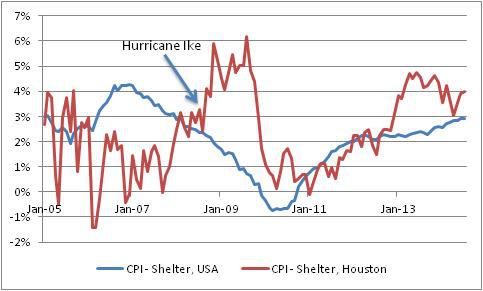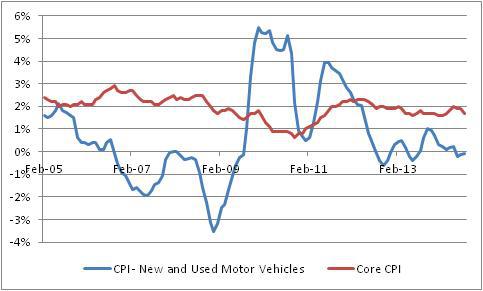It has been a rough few weeks. First, Hurricane Harvey drenched Houston and south Texas with feet of rain, turning millions into temporary refugees and tens of thousands of them into longer-term refugees as 40,000 homes were destroyed along with a million automobiles. Then, Hurricane Irma battered Miami and Tampa Bay, which is a rare feat, and seems likely to make it the fourth most-damaging hurricane in nominal dollar terms in US history (behind Katrina, Sandy, and Harvey).
And of course, yesterday was also the memorial of September 11th. I once thought that this day would someday become less raw, but remarkably the passage of time has not applied the usual salve in this case. I don’t know why. But the terrorist attacks of that day no longer affect the markets, so we nod and somberly reflect, and move on.
But those other two events will have an impact on markets and on data. Interestingly, the initial response to Irma was a strong rally in equity markets, as the damage was not as great as originally feared – perhaps $50bln, rather than $250bln, in damages. Aside from the human toll, whose value is beyond accounting, this is potentially a large figure for insurance companies and owners of catastrophe bonds (or what is left of them) but a mere scratch on the GDP of the nation as a whole. The total cost of the two hurricanes will be something in the neighborhood of 1% of GDP – although very unevenly distributed.
It is de rigeur in times like these to point out that GDP will increase over time with the expenditure of rebuilding, but of course the nation is not better off and so this is not good for the economy. More thoughtful models note that the national accounts gain that 1% back over the next few years, but local production from the affected areas is at least temporarily reduced so that the net effect is actually somewhat negative over the next several years. The net effect overall is small…but very unevenly distributed.
Some of the upward inflation pressure from the hurricanes comes from the additional pressure in commodities markets. Demand for steel and wood are likely to be elevated as these areas rebuild. For a short time, there will be higher prices for these things locally, and for gasoline, due to the difficulty of delivery to the affected communities.
The additional demand might even cause some marginal pressure in commodities markets for industrial metals (e.g.). But in the longer-term there will be no shortage of these items because these goods are bought and sold on international markets and are easily delivered to ports in Houston, Miami, and Tampa Bay. It just takes some time to get the logistics train running.
But the uneven distribution of the damage will matter in other ways. For example, there is no way to take a surplus of shelter in one area of the country and move it to another area (mobile homes excepted). Those 40,000 homes in Texas and thousands of others in Florida will need to be rebuilt in situ. Many others will need significant repairs to be nominally habitable. This will not happen overnight, which means that there is an abrupt shelter shortage in Houston and in Florida, and this can be expected to affect inflation.
It is very hard to assess just how much shelter inflation can be expected to follow from these storms. There aren’t many major hurricanes, and for each data point there are lots of other effects that get entangled so that my thoughts here are clearly speculative. But consider the chart below (Source: BLS), which shows Houston-area Shelter CPI (year/year) and compares it to the national Shelter CPI.

In September 2008, when Hurricane Ike hit Texas, housing prices nationally were already decelerating. They had remained elevated in Houston up to that point – thanks in part to $120/bbl oil – but probably would have rolled over almost immediately when the global financial crisis smashed energy markets along with housing markets. Yet, in Houston home prices actually accelerated over the next year before finally declining in late 2009. This is likely to be a side-effect of Ike, and I think we will see similar effects in the cost of shelter in Houston, Miami, and Tampa Bay this time too. This will likely provide a small upward lift to national Shelter prices and hence core CPI over the next year.
The other way that the hurricanes will help push core CPI higher is by helping to alleviate the recent pressure on motor vehicle prices. As the chart below (Source: BLS) shows, new and used vehicle inflation has not been a significant contributor to inflation since early 2012, thanks partly to years of channel-stuffing by manufacturers offering 0% financing along with great lease terms for those who don’t want to buy.

But consider late 2009. The “Cash for Clunkers” program, which took effect in mid-2009, provided cash rebates for consumers to swap used cars for new cars. While largely considered a failure as a stimulus plan, it did produce a sharp increase in motor vehicle prices overall. Prior to C4C, motor vehicle prices were stagnant; by the program’s end prices were rising and they kept rising for some time, at a rate of about 5% per annum between late 2009 and late 2010 – about 4% faster than core inflation at the time. Cash-for-Clunkers took about 700,000 cars off the road. Harvey is taking out about a million. Though those are all in Texas cars, unlike houses, are mobile and surplus inventories will surely be shipped southward with alacrity.
I don’t know why this is a bullish thing for the equity market. But I understand why inflation swaps are at three-month highs and headed higher.
